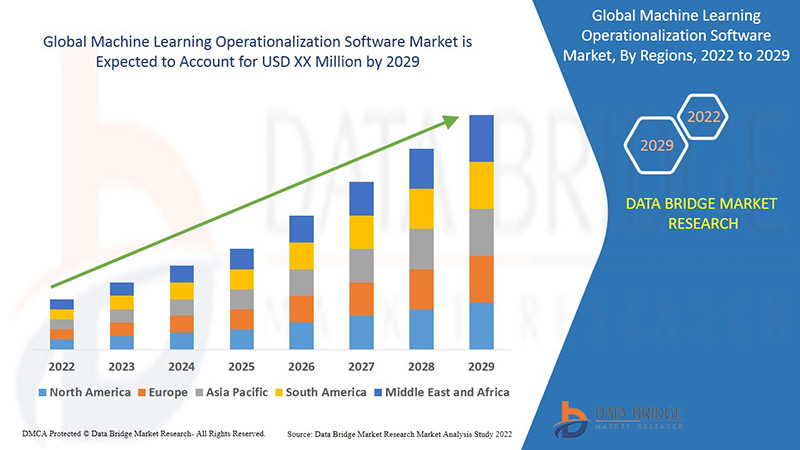Machine Learning Operationalization Software Market Poised for Rapid Growth Amid Rising AI Adoption

"Machine Learning Operationalization Software Market Size And Forecast by 2029
According to Data Bridge Market Research analyses that the machine learning operationalization software market will exhibit a CAGR of 44.7% for the forecast period of 2022-2029.
Innovation remains at the core of AI Deployment Software Market success, driving growth and customer engagement. Machine Learning Operationalization Software Market continuously invests in research and development to stay ahead of industry changes. By leveraging advanced technology, ML Model Integration Market enhances its solutions to meet consumer expectations. The strategic approach of Machine Learning Operationalization Software Market ensures that new products and services remain competitive. Machine Learning Operationalization Software Market remains a pioneer, delivering top-tier solutions with innovative strategies.
Data Science Ops Market plays a crucial role in shaping global market trends through its dynamic approach. The influence of Machine Learning Operationalization Software Market extends across industries, inspiring growth and development. Companies look to AI Workflow Automation Market as a benchmark for success, recognizing the brand’s leadership. By staying updated with consumer needs, Machine Learning Operationalization Software Market maintains its strong position. The adaptability of Scalable ML Solutions Market ensures continued influence in shaping industry patterns.
Our comprehensive Machine Learning Operationalization Software Market report is ready with the latest trends, growth opportunities, and strategic analysis. https://www.databridgemarketresearch.com/reports/global-machine-learning-operationalization-software-market
**Segments**
- **Deployment Type:** The global machine learning operationalization software market can be segmented based on deployment type into cloud-based and on-premises solutions. Cloud-based deployment offers scalability and flexibility, making it a popular choice for businesses looking to quickly implement machine learning solutions. On the other hand, on-premises deployment provides enhanced security and control over data, appealing to organizations with strict data governance requirements.
- **Organization Size:** Another key segmentation of the market is based on organization size, catering to small and medium-sized enterprises (SMEs) as well as large enterprises. SMEs often opt for machine learning operationalization software that is cost-effective and easy to deploy, while large enterprises require robust solutions that can handle massive datasets and complex algorithms.
- **Industry Vertical:** The market can also be segmented by industry vertical, with adoption of machine learning operationalization software varying across sectors such as healthcare, retail, finance, manufacturing, and others. Each industry has unique requirements and use cases for machine learning, leading to tailored software solutions that cater to specific needs.
- **Region:** Geographically, the market can be segmented into North America, Europe, Asia Pacific, Latin America, and Middle East & Africa. North America currently holds a significant market share due to the presence of tech giants and early adoption of advanced technologies. However, the Asia Pacific region is expected to witness rapid growth driven by increasing investments in AI and machine learning technologies.
**Market Players**
- **Microsoft Corporation:** A leading player in the market, Microsoft offers Azure Machine Learning service that enables businesses to build and deploy machine learning models efficiently. With a wide range of tools and integrations, Microsoft caters to diverse industry requirements.
- **IBM Corporation:** IBM's Watson Studio platform is a popular choice for organizations looking to operationalize machine learning models at scale. The platform provides a collaborative environment for data scientists and developers to work together on AI projects.
- **Google LLC:** Google's AI Platform is a robust solution for deploying machine learning models in the cloud. With advanced features such as automated machine learning (AutoML) and model monitoring, Google helps businesses streamline their machine learning workflows.
- **Amazon Web Services, Inc. (AWS):** AWS offers SageMaker, a fully managed service that simplifies the process of building, training, and deploying machine learning models. With scalable infrastructure and pre-built algorithms, AWS enables businesses to accelerate their AI initiatives.
- **SAS Institute Inc.:** SAS provides a comprehensive suite of machine learning operationalization tools through SAS Viya platform. With capabilities for model development, deployment, and monitoring, SAS caters to businesses across various industries.
https://www.databridgemarketresearch.com/reports/global-machine-learning-operationalization-software-market The global machine learning operationalization software market is experiencing significant growth and innovation driven by the increasing adoption of AI technologies across various industries. One emerging trend in the market is the integration of machine learning models into business operations to enhance decision-making processes and improve efficiency. This trend is particularly evident in sectors such as healthcare, where AI-powered solutions are being used for predictive analytics, personalized treatment plans, and medical image analysis. Similarly, in the finance industry, machine learning operationalization software is being leveraged for fraud detection, risk assessment, and algorithmic trading to optimize financial processes and mitigate risks.
Another key development in the market is the focus on explainable AI, where companies are increasingly seeking transparency and interpretability in machine learning models. This trend is driven by the need to comply with regulatory requirements and ensure ethical AI practices. Explainable AI enables organizations to understand how decisions are made by machine learning algorithms, leading to more trust in AI systems and better alignment with business objectives. As a result, machine learning operationalization software providers are enhancing their platforms with explainability features to meet the growing demand for transparent AI solutions.
Furthermore, the market is witnessing a rise in demand for industry-specific machine learning operationalization software tailored to unique use cases and requirements. For instance, in the retail sector, machine learning models are being used for demand forecasting, personalized recommendations, and supply chain optimization. In contrast, the manufacturing industry is leveraging AI for predictive maintenance, quality control, and process optimization to enhance operational efficiency and reduce downtime. By offering industry-specific solutions, software providers can address the specific needs of different sectors and drive adoption of machine learning technologies across diverse industries.
Moreover, with the increasing focus on data privacy and security, machine learning operationalization software vendors are investing in robust cybersecurity measures to protect sensitive data and ensure regulatory compliance. As businesses rely on machine learning models to process vast amounts of data, the need for secure and compliant solutions becomes paramount. Software providers are incorporating encryption, access controls, and audit trails into their platforms to safeguard data integrity and prevent unauthorized access. By prioritizing data security, vendors can build trust with customers and differentiate their offerings in a competitive market landscape.
In conclusion, the global machine learning operationalization software market is evolving rapidly, driven by technological advancements, changing industry dynamics, and shifting customer preferences. The trends towards integrating machine learning into business operations, enhancing explainable AI capabilities, developing industry-specific solutions, and prioritizing data security are reshaping the market landscape and presenting new opportunities for software providers. As organizations across sectors continue to harness the power of AI technologies, the demand for efficient, scalable, and secure machine learning operationalization software is expected to grow, driving innovation and competition in the market.The global machine learning operationalization software market is poised for continued growth and innovation fueled by the expanding adoption of AI technologies across diverse industries. One significant trend shaping the market is the increasing integration of machine learning models into business operations to enhance decision-making processes and boost operational efficiency. This trend is particularly evident in sectors such as healthcare, finance, and retail, where AI-powered solutions are being leveraged for predictive analytics, personalized services, and process optimization. By embedding machine learning capabilities into day-to-day operations, businesses can gain valuable insights, automate tasks, and drive competitive advantages in their respective industries.
Explainable AI has emerged as a key focus area within the machine learning operationalization software market as companies increasingly seek transparency and interpretability in AI models. The demand for explainable AI is being driven by regulatory requirements, ethical considerations, and the need for trust and accountability in AI systems. By enabling organizations to understand the decision-making process of machine learning algorithms, explainable AI can foster greater trust in AI solutions and align them more effectively with organizational objectives. Software providers are responding to this trend by enhancing their platforms with explainability features to meet the growing demand for transparent AI technologies.
Industry-specific machine learning operationalization software is also gaining traction in the market as businesses seek tailored solutions to address unique industry challenges and requirements. For example, retail companies are leveraging machine learning for demand forecasting and personalized recommendations, while manufacturing firms are using AI for predictive maintenance and quality control. By offering specialized solutions for different sectors, software providers can better cater to industry-specific needs and drive adoption of machine learning technologies across a wide range of industries.
Data privacy and security have become paramount concerns in the machine learning operationalization software market as organizations deal with vast amounts of sensitive data processed by AI models. Vendors are investing in robust cybersecurity measures such as encryption, access controls, and audit trails to protect data integrity and ensure regulatory compliance. By prioritizing data security, software providers can build trust with customers and differentiate their offerings in a competitive market environment where data protection is a critical consideration for businesses of all sizes and industries.
In conclusion, the global machine learning operationalization software market is undergoing rapid evolution driven by technological advancements, changing industry landscapes, and evolving customer demands. With trends towards integrating machine learning into business operations, enhancing explainable AI capabilities, developing industry-specific solutions, and prioritizing data security, software providers are well-positioned to capitalize on the growing demand for efficient, scalable, and secure AI solutions. As organizations continue to embrace AI technologies to drive innovation and competitiveness, the machine learning operationalization software market is expected to witness further growth, innovation, and market expansion in the coming years.
The market is highly fragmented, with a mix of global and regional players competing for market share. To Learn More About the Global Trends Impacting the Future of Top 10 Companies in Machine Learning Operationalization Software Market : https://www.databridgemarketresearch.com/reports/global-machine-learning-operationalization-software-market/companies
Key Questions Answered by the Global Machine Learning Operationalization Software Market Report:
- What is the current state of the Machine Learning Operationalization Software Market, and how has it evolved?
- What are the key drivers behind the growth of the Machine Learning Operationalization Software Market?
- What challenges and barriers do businesses in the Machine Learning Operationalization Software Market face?
- How are technological innovations impacting the Machine Learning Operationalization Software Market?
- What emerging trends and opportunities should businesses be aware of in the Machine Learning Operationalization Software Market?
Browse More Reports:
https://www.databridgemarketresearch.com/reports/global-software-engineering-market
https://www.databridgemarketresearch.com/reports/middle-east-and-africa-algae-products-market
https://www.databridgemarketresearch.com/reports/middle-east-and-africa-low-e-glass-market
https://www.databridgemarketresearch.com/reports/latin-america-rotomolding-market
https://www.databridgemarketresearch.com/reports/global-self-compacting-concrete-market
Data Bridge Market Research:
☎ Contact Us:
Data Bridge Market Research
US: +1 614 591 3140
UK: +44 845 154 9652
APAC: +653 1251 1013






